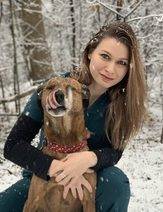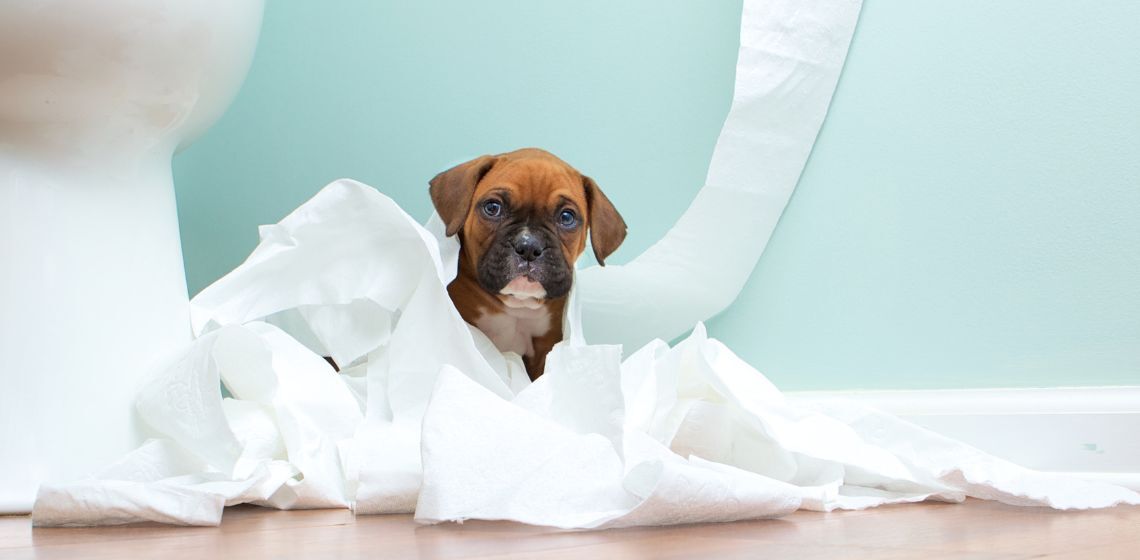Table of Contents
What causes diarrhea in puppies?
Diet Change
One of the most common causes of diarrhea is changing a puppy’s diet too abruptly. Young dogs begin developing a healthy gastrointestinal tract at an early age. They are sensitive to new additions or sudden changes in diet. Many pet owners will bring home a new puppy and switch its diet immediately to the food they prefer. This is a mistake; puppies can develop soft to liquid stools due to sudden changes. This is why it is crucial to find out what your puppy is eating before bringing it home. Have this food on hand for the first week or two. Gradually transition to your preferred diet over 7 to 10 days by adjusting the new to the old diet ratio each day. If stool changes are noted during this time, slow the transition or put the puppy back on the previous diet. Diarrhea caused by sudden diet change is typically self-limiting and will resolve without much intervention.
Parasites
Diarrhea in puppies can develop from gastrointestinal parasites. These parasites are transmitted from their mothers or contracted from a contaminated environment. The most common parasites in puppies include hookworms, roundworms, giardia, and coccidia. Signs of gastrointestinal parasites include soft and foul-smelling feces, poor appetite, vomiting, weight loss, and a distended abdomen. Owners may even see evidence of worms in the stool or vomit.
Parasites are extremely common, so it is important to treat puppies prophylactically. Puppies should be routinely dewormed by their family veterinarian every 2-3 weeks. To clear the infection, fecal testing should be performed during a new puppy visit and after treatment for suspected parasites. If your puppy has been diagnosed with parasites, the home environment should be cleaned thoroughly to prevent reinfection.
Dietary Indiscretion
Puppies, like toddlers, are prone to eating things they shouldn’t. Everything looks appetizing, which can certainly get them into a great deal of trouble. Eating non-food items or even foods unsuitable for them can lead to diarrhea. Puppies should not be fed table foods or allowed access to the garbage. They should be supervised at all times indoors and outside. Ingestion of non-digestible items can lead to life-threatening emergencies like a small intestinal obstruction. It is also important to limit treatment intake as too many treats or rich food items can cause diarrhea. Puppies should not be fed foods like bacon, sausage, cow’s milk, grapes, raisins, chocolate, or candy.
Parvovirus
Any puppy that develops ongoing diarrhea should be tested for Parvovirus. This is a very contagious, potentially life-threatening virus. It is common amongst young, incompletely vaccinated puppies and unvaccinated dogs. The virus can be prevalent in settings where many dogs live together, like shelters. It replicates in rapidly dividing cells of the body, including those of the gastrointestinal tract and immune system. The virus damages the intestines leading to profuse diarrhea, vomiting, weight loss, and dehydration. Puppies can quickly become critically ill due to dehydration or sepsis, so immediate action should be taken. Diagnosis is relatively easy after performing a fecal swab. Puppies with this illness generally require hospitalization and treatment with intravenous fluids, anti-nausea medication, and antibiotics. Many will make a full recovery, but some puppies may die.
Prevention of parvovirus is critical. Puppies should receive a minimum of three vaccines against parvovirus. Puppies who have yet to have their complete series of vaccinations should not be taken to public places. Do not allow puppies to interact with unvaccinated dogs or those whose vaccination history is unknown.
Distemper virus
Distemper is another highly contagious viral disease. This disease is not as common as parvovirus but is more deadly. Puppies contract this virus from other infected animals. Clinical signs include vomiting, diarrhea, ocular/nasal discharge, coughing, and fever. The diagnosis is performed with conjunctiva or nose swabs, which are then sent to a laboratory. Treatment almost always includes hospitalization, intravenous fluid support, anti-emetics, and antibiotics to prevent secondary bacterial infection. There is no directed treatment for the distemper virus, and most puppies will need to be supported aggressively while their body combats the virus naturally.
Prevention via vaccination is vital, and puppies should receive three total vaccines against the distemper virus. These vaccines are part of the combination shot used to prevent parvovirus, adenovirus, and parainfluenza. Puppies should not be allowed in public areas or access to other unvaccinated dogs until they are fully vaccinated.
How is diarrhea treated in puppies?
Many causes of diarrhea in puppies are preventable. As pet owners, we must be alert for these common causes of diarrhea in puppies. If you are ever concerned, contact your family veterinarian to discuss your puppy’s diarrhea. They will discuss diagnostic and treatment options with you to have your puppy feeling better as soon as possible.
Diarrhea in puppies can occur for many reasons. The most common causes are infectious diseases, sudden food changes, dietary indiscretion, and gastrointestinal parasites.
The duration of diarrhea in puppies is variable and relies on resolving the underlying issue. Diarrhea lasting for more than a day likely means the cause of the diarrhea has not been resolved. Most self-limiting causes of diarrhea will resolve in 1-2 days.
A single episode of diarrhea in puppies is not overly concerning. Feed a bland diet of boiled chicken and rice if your puppy has minor diarrhea. Any puppy with profuse, liquid, bloody, or ongoing diarrhea requires urgent veterinary intervention.

Dr. Paula Simons is an Emergency and Critical Care Veterinary Resident who aspires to be a veterinary criticalist. Dr. Simons is passionate about supporting pets and humans during their times of need. She has a special interest in critical care nutrition, trauma, and pain management. In her free time, she loves plant shopping, hiking, and traveling. She has volunteered in several different countries to help animals in need. She has two cats, Moo and Kal.








